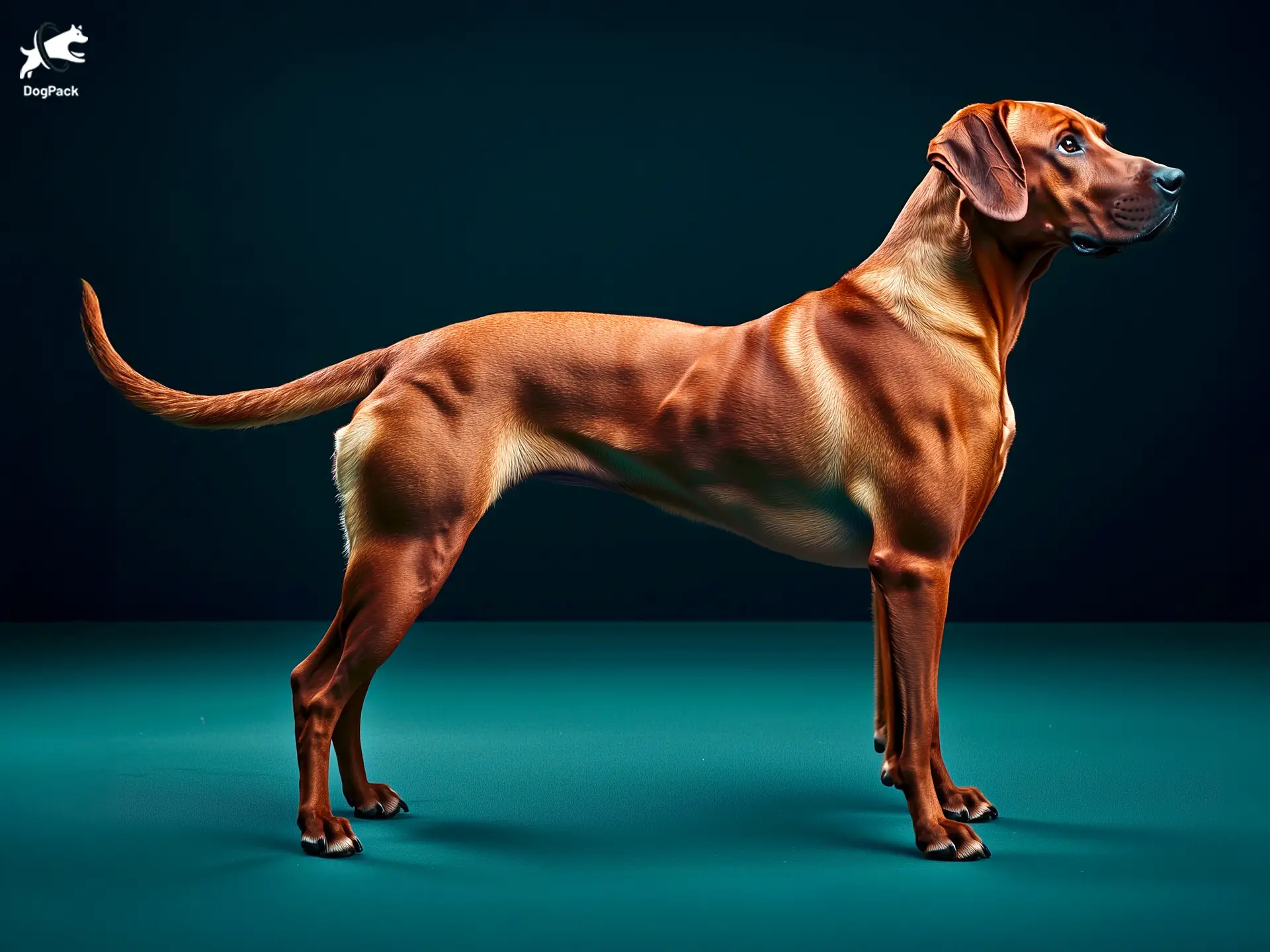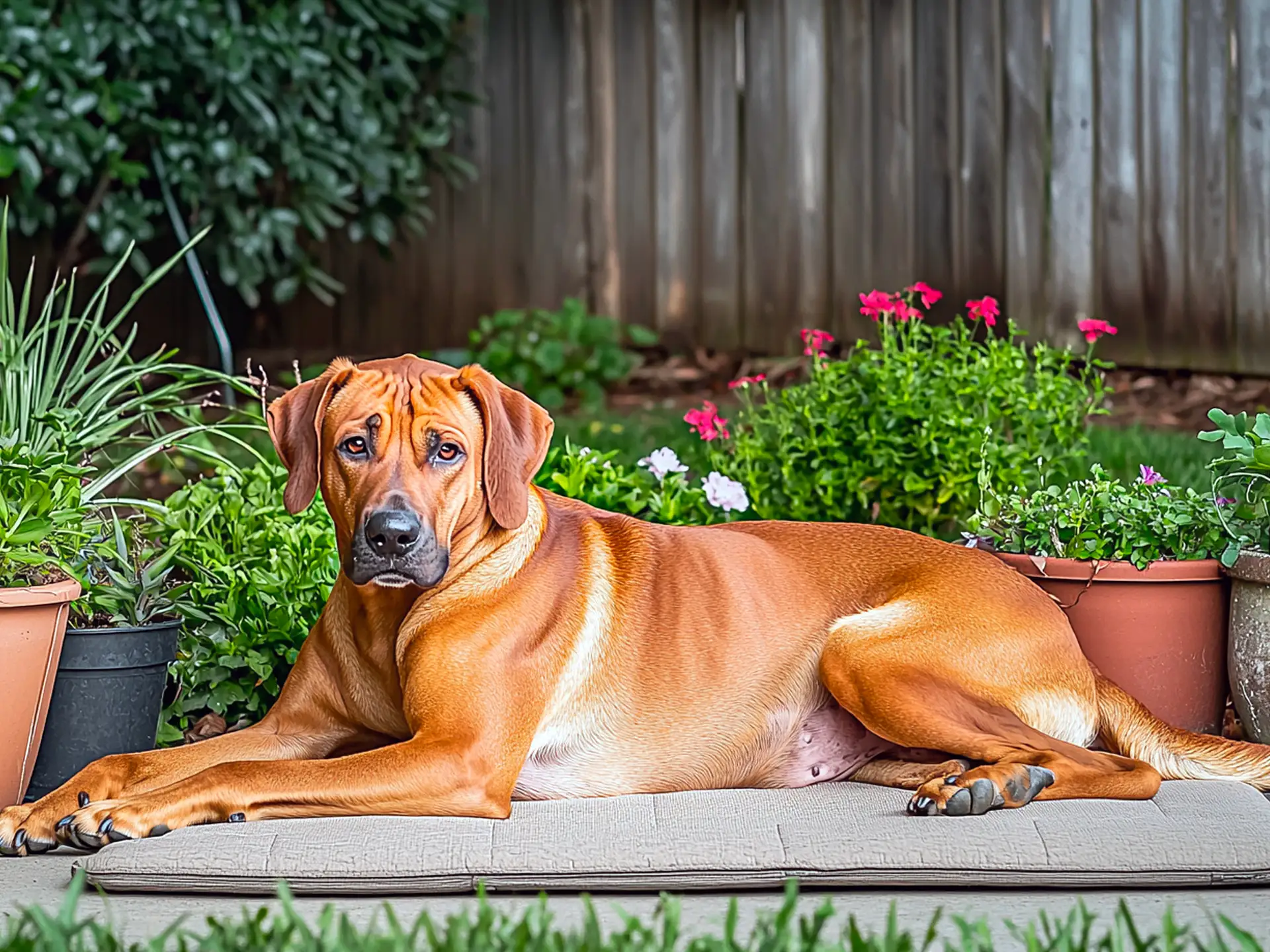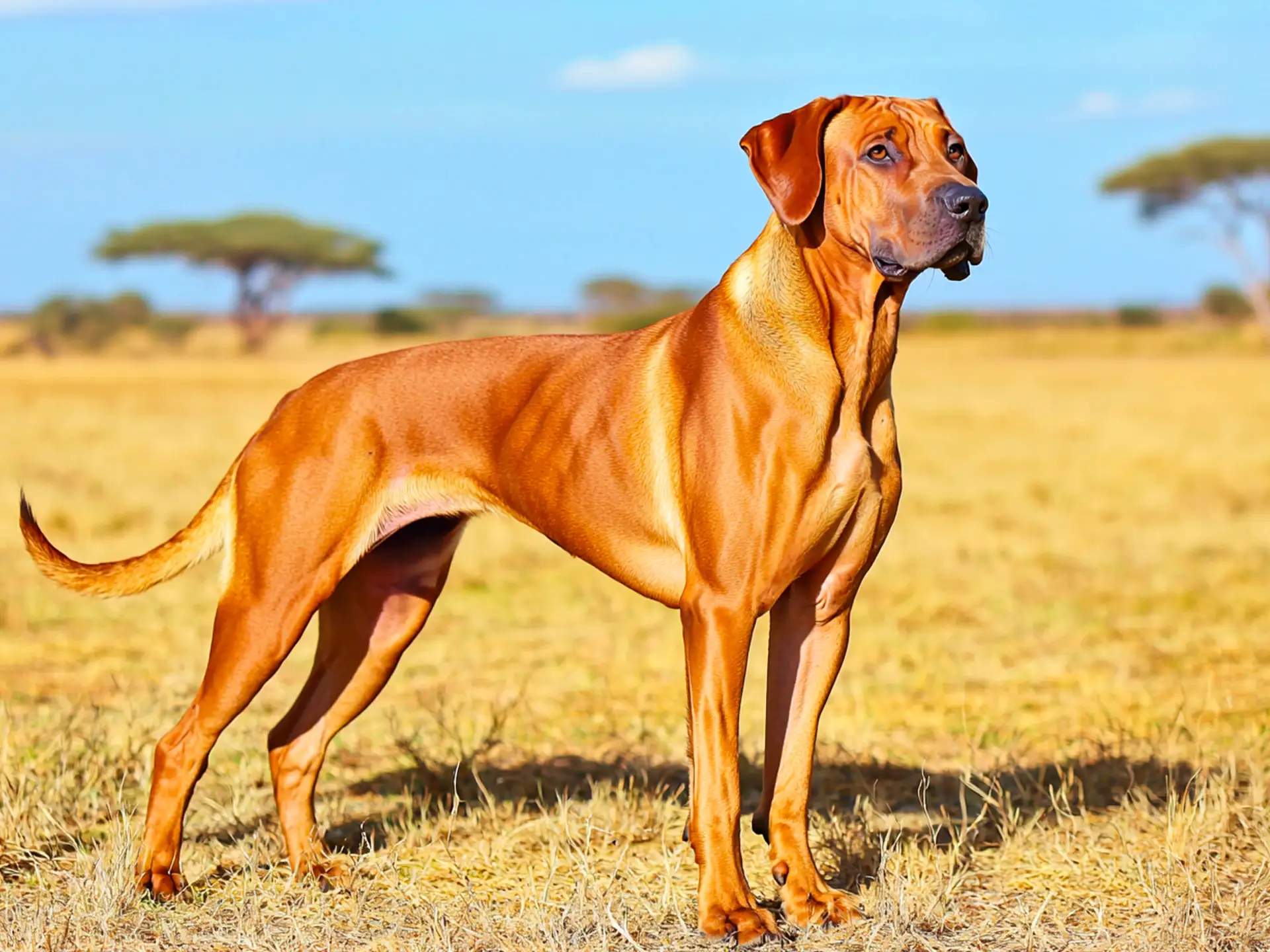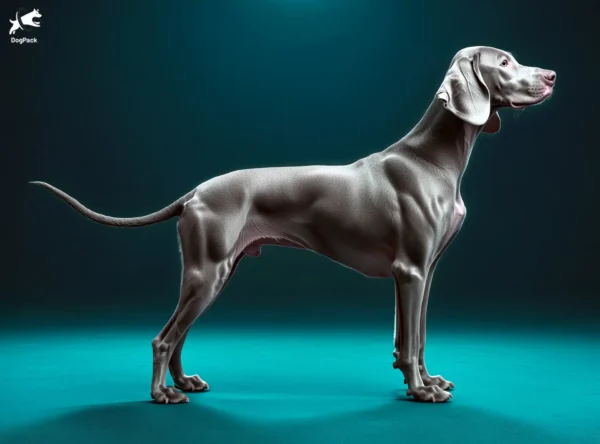Rhodesian Ridgeback Dog Breed Info & Overview
The Rhodesian Ridgeback, famed for its history as a lion hunter in Africa, is a remarkable blend of strength, athleticism, and loyalty. Distinguished by the unique ridge of hair running along its back, this intelligent and courageous breed thrives with active owners who can match its energy and adventurous spirit. Both a protective guardian and an affectionate companion, the Rhodesian Ridgeback is a breed like no other.
Characteristics
Pictures
Breed History
The Rhodesian Ridgeback traces its origins back to Southern Africa, specifically Zimbabwe, formerly known as Rhodesia. In the late 19th century, European settlers bred their dogs with the native Khoikhoi people’s semi-domesticated ridged hunting dogs. This crossbreeding aimed to develop a dog capable of hunting large game, including lions.
These dogs were prized for their courage, endurance, and the distinctive ridge of hair along their backs that grows in the opposite direction—a trait unique to the breed. They were not only hunters but also protectors of homesteads, showcasing their versatility and loyalty.
In 1922, the first breed standard for the Rhodesian Ridgeback was drafted in Bulawayo, Southern Rhodesia. Since then, the breed has gained popularity worldwide for its unique appearance and admirable qualities. Today, they are cherished as loyal companions and guardians.
Temperament, Personality
Rhodesian Ridgebacks are known for their dignified and independent nature. They form strong bonds with their families and are incredibly loyal. While they may appear reserved with strangers, early socialization helps them become more approachable and well-mannered in various situations.
Their intelligence and strong-willed personality mean they require consistent training from an early age. They are affectionate with family members but can be protective, making them excellent watchdogs. Their instincts stem from their history as hunters and guardians.
These dogs are generally good with children, especially when raised together. However, due to their size and energy, supervision is recommended around small kids. They can coexist with other pets if introduced properly, but their prey drive might be an issue with smaller animals.
Physical Characteristics
The most striking feature of the Rhodesian Ridgeback is, of course, the ridge of hair along its spine growing opposite to the rest of the coat. This ridge is formed by a narrow strip of hair that grows in the opposite direction and is a hallmark of the breed.
They have a short, dense coat that comes in varying shades of wheaten, sometimes with a little white on the chest and toes. Their muscular build and athletic physique are a testament to their heritage as hunting dogs capable of great endurance.
With a strong, deep chest and a balanced, symmetrical body, these dogs exude power and elegance. Their impressive size places them among Large Dog Breeds. Their eyes are round and bright, expressing alertness and intelligence.
Health Issues
Like all breeds, the Rhodesian Ridgeback is prone to certain health conditions. One of the primary concerns is hip dysplasia, a hereditary condition where the thigh bone doesn’t fit properly into the hip joint. Regular veterinary check-ups and responsible breeding practices help mitigate this risk.
Dermoid sinus, a congenital skin defect, is another condition seen in this breed. It involves a tube-like opening from the skin surface to deeper tissues and can cause infections. Early detection and surgical removal are essential for affected puppies.
They may also be susceptible to hypothyroidism and certain types of cancers. Ensuring a healthy diet, regular exercise, and routine health screenings can contribute to a long, healthy life for your Rhodesian Ridgeback.
Grooming Needs
One of the perks of owning a Rhodesian Ridgeback is their low-maintenance coat. Their short, dense fur requires minimal grooming—weekly brushing is usually sufficient to remove loose hair and keep their coat shiny and healthy.
They are moderate shedders, and seasonal shedding can be managed with more frequent brushing. Bathing should be done as needed, typically every few months, unless they get into something messy. Their coat naturally repels dirt, making them relatively clean dogs.
Don’t forget routine care like nail trimming, ear cleaning, and dental hygiene. Regularly check their ears for signs of infection and brush their teeth several times a week to maintain good oral health.
Exercise Requirements
Rhodesian Ridgebacks are high-energy dogs that require ample exercise to keep them happy and healthy. Daily walks, runs, or play sessions totaling at least 1–2 hours are essential to meet their physical needs.
They excel in activities like hiking, jogging, and agility training. These activities not only provide physical exercise but also mental stimulation, which is crucial for this intelligent breed. A bored Ridgeback may become destructive. For more breeds that love activity, explore our Sporting Dogs.
A securely fenced yard is recommended, as their hunting instincts might lead them to chase after small animals. Remember, they were bred to cover great distances, so regular, vigorous exercise is key to preventing behavioral issues.
Training Tips
Training a Rhodesian Ridgeback requires patience, consistency, and a firm but positive approach. Their independent nature can sometimes be mistaken for stubbornness, so early obedience training is crucial.
Positive reinforcement techniques work best, as harsh methods may lead to resistance. Socialization from a young age will help them become well-adjusted adults comfortable with various people, pets, and environments.
Enrolling in puppy classes can provide structured learning and socialization opportunities. Remember, making training sessions engaging and rewarding will yield the best results with this intelligent breed. For professional guidance, consider resources from the Association of Professional Dog Trainers.
Nutrition, Diet
Feeding your Rhodesian Ridgeback a high-quality diet is essential for their overall health. Due to their active nature, they require a diet rich in proteins and nutrients to support muscle development and energy levels.
Portion control is important to prevent obesity, which can exacerbate health issues like hip dysplasia. Typically, an adult Ridgeback will consume around 2.5 to 3.5 cups of quality dry dog food per day, divided into two meals.
Consult with your veterinarian to determine the specific dietary needs based on age, weight, and activity level. Fresh water should always be available, and treats should be given sparingly to avoid unnecessary weight gain.
Adoption, Breeders
If you’re considering adding a Rhodesian Ridgeback to your family, it’s crucial to find a reputable breeder or consider adoption. Reputable breeders will provide health clearances and allow you to meet the puppy’s parents.
Organizations like the Rhodesian Ridgeback Club of the United States can provide resources to find responsible breeders and rescue groups. Adopting from a rescue can be a rewarding experience and gives a dog a second chance at a loving home.
Always avoid puppy mills or pet stores that cannot provide detailed health and lineage information. Doing thorough research ensures you bring home a healthy and well-adjusted Rhodesian Ridgeback.
Family Pet?
The Rhodesian Ridgeback can make an excellent family pet for those who understand their needs. They are affectionate with family members and can be gentle with children when properly socialized and supervised.
Their size and energy levels mean they might unintentionally knock over small kids, so interactions should be monitored. They can coexist with other pets if raised together but may chase smaller animals due to their prey drive.
Overall, they thrive in active households that can provide the exercise and mental stimulation they require. Their protective nature makes them loyal guardians of the home and family. For other protective breeds, check out Dogs for Protection.
Right For You?
Before bringing a Rhodesian Ridgeback into your life, consider if you can meet their physical and mental needs. They are best suited for experienced dog owners who lead active lifestyles and have the time to dedicate to training and exercise.
If you’re looking for a loyal, intelligent, and protective companion and have the space and commitment to care for them properly, this breed might be the perfect match. They are not ideal for apartment living or sedentary households.
Ultimately, owning a Rhodesian Ridgeback is a rewarding experience for those prepared to invest in their well-being. Their unique qualities make them stand out among other breeds.
Conclusion
In summary, the Rhodesian Ridgeback is a remarkable breed with a rich history and unique characteristics. Their loyalty, intelligence, and protective nature make them exceptional companions for the right owners. If you have the time, space, and dedication to meet their needs, you may find the perfect canine partner in this majestic breed.
FAQs
-
What makes the ridge on a Rhodesian Ridgeback unique?
The ridge is a distinctive feature formed by hair growing in the opposite direction along their back. This trait is inherited and a defining characteristic of the breed, often evaluated during breed standards.
-
How do Rhodesian Ridgebacks handle extreme weather?
Rhodesian Ridgebacks tolerate warm climates well due to their African heritage. However, they are less suited to cold weather and may need a coat or limited outdoor exposure in winter to stay comfortable.
-
Can Rhodesian Ridgebacks be trained for non-hunting roles?
Yes, Rhodesian Ridgebacks excel in therapy work, agility, and obedience competitions. Their intelligence and loyalty make them adaptable to various roles beyond hunting, as long as training is consistent and engaging.
-
How independent are Rhodesian Ridgebacks?
Rhodesian Ridgebacks are known for their independent streak, a trait from their hunting background. While loyal to their families, they may require patient and firm training to establish boundaries and ensure reliability.
-
What are common myths about Rhodesian Ridgebacks?
One common myth is that Rhodesian Ridgebacks are aggressive, but they are typically reserved and gentle with proper socialization. Another misconception is that they only thrive in hunting roles, while they adapt well as loving family companions.
Breed Ratings
The Rhodesian Ridgeback is intelligent and learns quickly but can be independent, requiring consistent training methods.
They enjoy playtime but may have a more dignified demeanor compared to other breeds, balancing fun with calmness.
High energy levels mean they need plenty of exercise to stay happy and prevent boredom-related behaviors.
They are moderate shedders with a short coat, making grooming relatively easy compared to long-haired breeds.
Strong prey drive due to their hunting background; caution is needed around small animals and during off-leash activities.
Their short coat requires minimal grooming—regular brushing and occasional baths keep them looking their best.
While intelligent, their independent nature can make training a challenge; patience and positive reinforcement are essential.
They prefer companionship and may develop separation anxiety if left alone for extended periods.
Generally quiet, they don’t bark excessively but will alert their owners when necessary.
Low drooling tendency makes them a cleaner choice for those who prefer less mess around the home.
Can be friendly with other dogs if properly socialized, but their dominance may show around unfamiliar canines.
Generally healthy but prone to certain hereditary conditions; regular vet care is important for early detection.
















